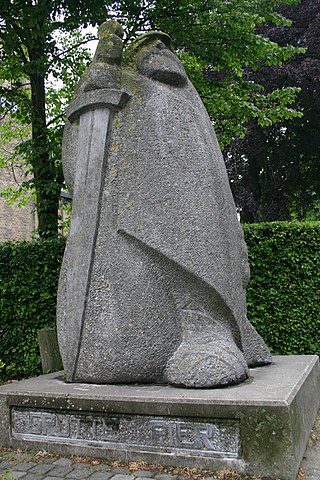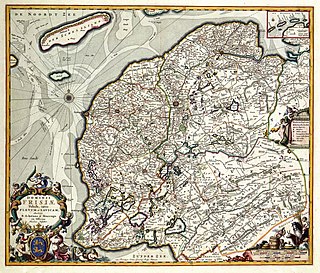The Frisians are an ethnic group indigenous to the coastal regions of the Netherlands, north-western Germany and southern Denmark, and during the Early Middle Ages in the north-western coastal zone of Flanders, Belgium. They inhabit an area known as Frisia and are concentrated in the Dutch provinces of Friesland and Groningen and, in Germany, East Frisia and North Frisia.

Frisia is a cross-border cultural region in Northwestern Europe. Stretching along the Wadden Sea, it encompasses the north of the Netherlands and parts of northwestern Germany. Wider definitions of ‘Frisia’ may include the island of Rem and the other Danish Wadden Sea Islands. The region is traditionally inhabited by the Frisians, a West Germanic ethnic group.

The County of Holland was a state of the Holy Roman Empire and from 1433 part of the Burgundian Netherlands, from 1482 part of the Habsburg Netherlands and from 1581 onward the leading province of the Dutch Republic, of which it remained a part until the Batavian Revolution in 1795. The territory of the County of Holland corresponds roughly with the current provinces of North Holland and South Holland in the Netherlands.

North Frisia is the northernmost portion of Frisia, located in Schleswig-Holstein, Germany, between the rivers Eider and Wiedau. It also includes the North Frisian Islands and Heligoland. The region is traditionally inhabited by the North Frisians.
Jancko Douwama was a Frisian nobleman who fought to free Friesland from foreign rule during the Vetkopers and Schieringers conflict, the Saxon feud and the Guelders Wars.

Frisian involvement in the Crusades is attested from the very beginning of the First Crusade, but their presence is only felt substantially during the Fifth Crusade. They participated in almost all the major Crusades and the Reconquista. The Frisians are almost always referred to collectively by contemporary chroniclers of the Crusades and few names of individual Frisian crusaders can be found in the historical record. They generally composed a naval force in conjunction with other larger bodies of crusaders.

The Vetkopers and Schieringers were two opposing Frisian factional parties from the medieval period. They were responsible for a civil war that lasted for over a century (1350–1498) and which eventually led to the end of the so-called "Frisian freedom".
Karelsprivilege is a legendary privilege that Charlemagne allegedly paid to the Frisians led by Magnus Forteman to thank them for the support that was given to his attack on Rome. Since the 13th century, the Frisians regularly mentioned Karelsprivilege in legal and historical works. The authenticity of the privilege has been heavily contested, especially after the Middle Ages. The privilege formed the basis of the so-called Frisian freedom. It was recognized as genuine by a number of Holy Roman emperors. An affirmation and recognition of the privilege was given by Emperor Conrad II in 1039.

The Frisian freedom was a period of the absence of feudalism in Frisia during the Middle Ages. Its main aspects included freedom from serfdom, feudal duties and taxation, as well as the election of judges and adjudicators.

Friso is a legendary king of the Frisians who is said to have ruled around 300 BC. According to Martinus Hamconius in his 17th-century chronicle Frisia seu de viris rebusque illustribus, and also the 19th-century hoax Oera Linda Book, Friso was a leader of a group of Frisian colonists who had been settled in the Punjab for well over a millennium when they were discovered by Alexander the Great. Taking service with Alexander, Friso and the colonists eventually found their way back to their ancestral homeland of Frisia, where Friso founded a dynasty of kings.

Frisia is a small region in the north of the modern day country known as the Netherlands. In the Iron Age, the ancestors of the modern Frisians first migrated south out of modern day Scandinavia to the south west where they began to settle along the coast. The archeological record goes all the way back to the Neolithic era, however, the first written sources for Frisian history come from Roman records, like Tacitus' account of an unsuccessful Frisian attack on a Roman fort. Frisia would go on to distinguish itself culturally from other Germanic peoples but remained recognizably Germanic nonetheless. In the Early Medieval era, Frisians took the seas with well crafted ships to perform trade and to raid other ports, cities, and towns in other parts of Europe. For most of its modern history, Frisia, or Frysland, has been under the control of the Netherlands but today their language is co-official with Dutch at the provincial level. Frisian is the most closely related language to English aside from Scots.

The Frisian Kingdom, also known as Magna Frisia, is a modern name for the post-Roman Frisian realm in Western Europe in the period when it was at its largest (650–734). This dominion was ruled by kings and emerged in the mid-7th century and probably ended with the Battle of the Boarn in 734 when the Frisians were defeated by the Frankish Empire. It lay mainly in what is now the Netherlands and – according to some 19th century authors – extended from the Zwin near Bruges in Belgium to the Weser in Germany. The center of power was the city of Utrecht.

Almenum is a historic locality in the northern Netherlands, near Midlum, Friesland the site of the first Christian church in Friesland. Saint Boniface set up a local church in the locality in 754. The location of the church is on the Terp of Almenum, a mound of earth about five meters high. Almenum is named after the place where someone called "Allaman" lived. The -um suffix is derived from the West Frisian word "hiem" meaning "home". An alternative explanation for the name of the locality is that it originally meant common lands for grazing cattle. In Icelandic this kind of land still uses the term "almenningurheim".
The Saxon feud was a military conflict in the years 1514–1517 between the East Frisian Count Edzard I, 'West Frisian' rebels, the city of Groningen, and Charles II, Duke of Guelders on the one hand and the Imperial Frisian hereditary governor George, Duke of Saxony – replaced by Charles V of Habsburg in 1515 – and 24 German princes. The war took place predominantly on East Frisian soil and destroyed large parts of the region.

The Seignory of Frisia or Seignory of Friesland was a feudal dominion in the Netherlands. It was formed in 1498 by King Maximilian I and reformed in 1524 when Emperor Charles V conquered Frisia.
In legend and in the early historiography of Switzerland there is an account of a migration of a population of Swedes and Frisians settling in the Swiss Alps, specifically in Schwyz and in Hasli (Schwedensage).
Saint Fris, also known as Fris de Bassoues, Latin Frisius or Frisus, also Frix, or Fritz, is a warrior saint worshiped in the region Aquitaine, département Gers, in France.

Frisian nationalism refers to the nationalism which views Frisians as a nation with a shared culture. Frisian nationalism seeks to achieve greater levels of autonomy for Frisian people, and also supports the cultural unity of all Frisians regardless of modern-day territorial borders. The Frisians derive their name from the Frisii, an ancient Germanic tribe which inhabited the northern coastal areas in what today is the northern Netherlands, although historical research has indicated a lack of direct ethnic continuity between the ancient Frisii and later medieval 'Frisians' from whom modern Frisians descend. In the Middle Ages, these Frisians formed the Kingdom of Frisia and later the Frisian freedom confederation, before being subsumed by stronger foreign powers up to this day.











